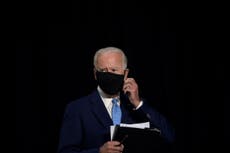Members of the intelligence community told me they're very concerned by Trump's response to Russian bounties
'There just seem to be zero answers from the White House, and frankly, no concerns about it'


In 2015, the United States settled a 36-year-old debt by repaying the Islamic Republic of Iran $400 million plus $1.3 billion in interest — $1.7 billion in total — for military equipment the previous Iranian government purchased but never received in the late 1970s.
This settlement, which avoided the possibility of a far larger judgment being made against the US in the Iran-US Claims Tribunal established after the 1979 hostage crisis, quickly became fodder for conspiracy-mongering and invective from Republicans — including then-candidate Donald Trump — who suggested that the Obama administration was turning a blind eye to the killing of American soldiers. This conspiracy-mongering was mainly based on prior reports accusing Iran of paying Taliban fighters $1,000 bounties for each US soldier they kill in Afghanistan.
Five years later, another US adversary — Vladimir Putin’s Russia — is paying Taliban-linked militants cold, hard cash to kill American troops. It’s a pretty shocking revelation. But, confusingly enough, many of the same Republicans who expressed outrage over repaying an old debt to Iran appear angrier at the fact that Americans now know their soldiers are being targeted than they are at the idea that Russia would pay to kill Americans in the first place.
Since the news hit that US intelligence agencies had learned of Russia’s payment of bounties to Taliban-linked militants in return for killing American soldiers — and briefed President Trump on those findings — the response from the White House has followed a pattern that should be familiar to anyone familiar with the first three years of the Trump presidency.
The President’s first public remarks on the matter came (where else) via a post to his Twitter account on Saturday, shortly before he climbed into a Secret Service SUV to be transported to his Virginia golf club.
In it, Trump claimed that “nobody briefed or told” him, Vice President Mike Pence, or White House Chief of Staff Mark Meadows “about the so-called attacks on our troops in Afghanistan by Russians, as reported through an ‘anonymous source’ by the fake news [New York Times],” Trump wrote, before adding a false claim that “there have not been many attacks” on US forces in Afghanistan (24 US servicemen died there last year.) He went on to call the story “another phony Times hit job, just like their failed Russia Hoax”.
White House Press Secretary Kayleigh McEnany also weighed in on the matter that day with a statement claiming neither Trump nor Pence were briefed on what she called the "alleged Russian bounty intelligence". And when she addressed reporters on Monday, McEnany repeatedly claimed that Trump had not been briefed because the intelligence regarding Russia’s alleged payment of bounties had not been “verified”, before storming away from the lectern after attacking the Times for publishing the information in the first place.
By Monday evening, several top Trump political appointees, including National Security Adviser Robert O’Brien and Director of National Intelligence John Ratcliffe (neither of whom had any significant intelligence experience prior to serving in those offices), were echoing the White House’s spin with statements dismissing the reports as unjustified leaks of “unverified and unsubstantiated intelligence” about which there was no “consensus” within the US intelligence community.
But former National Security Council officials who’ve served in recent administrations said the Trump administrations claims that the intelligence regarding Russia’s malign activity is somehow unreliable because there is no community consensus do not hold water.
“It’s total bulls**t,” said one former NSC staffer, who requested anonymity in order to speak more candidly.
The ex-staffer, who has served under both Republican and Democratic presidents — including Trump — said the lack of a consensus or the existence of a dissenting opinion from another part of the intelligence community neither negates an intelligence source nor renders it insufficiently important to warrant the president’s attention.
“The SIGINT [signals intelligence] people are always suspicious of the HUMINT [human intelligence] sources, so there’s always going to be some kind of dissent if there’s nothing on the wires about a given matter,” the ex-official said, adding that the lack of a consensus is no bar to bringing a matter to the president if there are dead Americans involved.
Joshua Geltzer, who served as the NSC Senior Director for Counterterrorism under the Obama administration, said the strenuous denials and protestations about “unverified” intelligence from officials like McEnany, O’Brien, and Ratcliffe suggest that the media reports about what Trump knew and when are accurate.
“I almost read those protestations, really, as confirmation that there was intelligence on this, consistent with what had been reported by that point… by many reputable outlets,” he said, adding that the White House’s denials were “almost implicit confirmation that there was the thrust of something there”.
Geltzer dismissed the claims that the intelligence reported on by numerous outlets over the past few days was somehow unreliable because there was no consensus on its reliability within the intelligence community.
“It is quite common to have different parts of the intelligence community set the confidence levels or even interpret intelligence slightly differently,” he explained. “That is not a reason that that information doesn't flow to policymakers, and it’s not a reason that policymakers hold off on trying to think about what to do, or on doing something about that intelligence.”
Continuing, Geltzer slammed the White House for appearing more concerned with the fact that information was leaked than with the substance of the information itself.
“I have not heard one indication from at least the White House — I've seen it with some of the department agency statements, but not one word from the White House — that if true, this reporting concerns us, or that to the extent that reporting is true, the right work is being done internally to address it,” he said. “Instead, it’s an attack back at the reporting.”
“I'm somebody who worked in the National Security Division of DOJ. I'm not a defender of leaks. But the… whole White House response is ‘Why is this information out there?’ rather than addressing what we even now see the families of service members say, which is, ‘But what about the underlying allegations? What have you done to try to protect America's service members?’ There just seem to be zero answers from the White House, and frankly, no concerns about it,” he added.
Another former official — one who worked within the Trump administration — said that for better or worse, the White House’s concerns are not with the troops being targeted, but with a president who feels that he is yet again being targeted with leaks to stop his reelection.
“They don’t care about what Russia did as much as they care that you know what Russia did,” he said.



Join our commenting forum
Join thought-provoking conversations, follow other Independent readers and see their replies